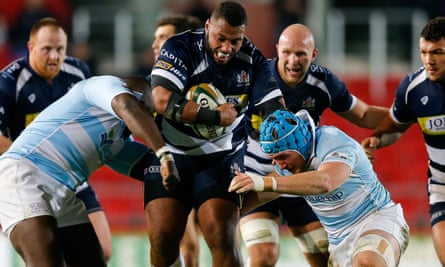As Saracens will discover when they drop into the Championship next season, there are two types of professional rugby player: the have and the have-not. The gap between the Premiership and Championship was wide enough already before the Rugby Football Union turned it into a chasm with Wednesday’s announcement that funding to the second tier would be slashed from next season. Life was already hard for players and clubs; now many fear it will be nigh on impossible to continue in their current form.
For a taste of reality away from the glamour of the Six Nations and the Premiership, consider instead the story of the former Bedford Blues and Canada player Justin Blanchet. As recently as September, he was still vying for selection for his country’s Rugby World Cup squad. The week before the team landed in Japan, playing in a warmup Test against the USA in Vancouver, he suffered his fourth concussion in 12 months. With a history of head injuries already, it proved one too many for the Montreal-born back-rower.
The 26-year-old’s abrupt departure from the game went mostly unnoticed among the rugby public. Yet Blanchet’s story underlines the stark realities of professional rugby, particularly that of England’s second tier. Outside the Premiership, there is no safety net if things go wrong.
“There is a feeling, particularly in the Championship, of whether it is all worth it,” says Blanchet. “I became frustrated with rugby. I was giving up so much of my body, my mind and emotion. Most Championship players are on significantly less than people may think.

“Personally, I just didn’t feel I was being properly remunerated. When players are earning no more than £20,000 to £30,000 and start getting injuries, questions begin coming into your head.”
In the case of Blanchet, who has seven Canada caps to his name and has also played at Exeter Chiefs, last year was the final straw. “As a sports person you are selfish with a narrow view of things and my goal was the World Cup. I knew the more I told the medical team about my head injuries, the less likely I would be going to the tournament.
“But my body was failing me. On top of my head injuries, within a year I had two broken arms that never felt like they were healing fully.”
In the Championship, even before the current financial model is ripped up, getting injured can spell disaster financially. Blanchet considers himself one of the lucky ones because Bedford ensure their players are properly covered in terms of medical insurance. It is not the case everywhere.
“It’s not great if I’m honest. You hear of horror stories from other clubs of those not covered, something that is unfathomable. In the Championship, there is no support network. It is sad to feel that in a professional setup there is no one acting on your behalf. In all honesty it feels a bit amateur,” says Blanchet, who holds an economics degree from the University of Exeter.
“A few years ago, there was a story in the Guardian about the Championship being the wild west of rugby. I think that’s bang on. I think the Rugby Players’ Association is great but the fact they don’t cover the whole of the professional environment needs to be addressed. Why is there not a group for everyone playing the game professionally?”
Blanchet’s story is not uncommon in the Championship. The league may have helped numerous players along the road to international recognition but that does not paint the full picture. The English second tier is not a lush pasture for professional players to graze on, particularly if bad luck strikes.
“Injuries don’t just cost you appearances, they cost you a contract, a way of literally paying the bills,” says Blanchet. “Squads and budgets are small and clubs don’t have the resources to keep someone who is injury prone. I’ve seen it so many times. There is that added pressure of feeling you need to get back on the field even if you aren’t 100%. I’m sure many players will testify to the same feelings I had. Physically and financially I felt I was stagnating with it all.”
As the Premiership salary cap debate rages on, it is also worth remembering that plenty of players are being paid a pittance for taking precisely the same risks as their top-tier cousins. It is a situation that will only worsen next season when the RFU cuts the annual central funding for each club from £530,000 to £280,000. Many Championship players say they frequently feel like second-class citizens.

“Just having access to work experience days would be huge, or even having an individual for players to contact if they need help on a personal matter,” adds Blanchet. “At the moment there’s nothing. I’m lucky that I have incredible support from my family and girlfriend, but not everyone may have that.
“I don’t regret rugby, it has given me some important life skills and has allowed me to meet some incredible people. Ultimately, though, the transition when you finish is incredibly challenging. I just stress to all players to look after yourself and think about life outside of rugby.”
Fortunately for Saracens, their players will continue to be looked after by the RPA as part of the parachute payments that go to the teams relegated to the Championship. Funding from the RFU will also not be such a pressing issue. Blanchet’s story, though, is all too typical among those who will be dining at the same table as Saracens next season.
